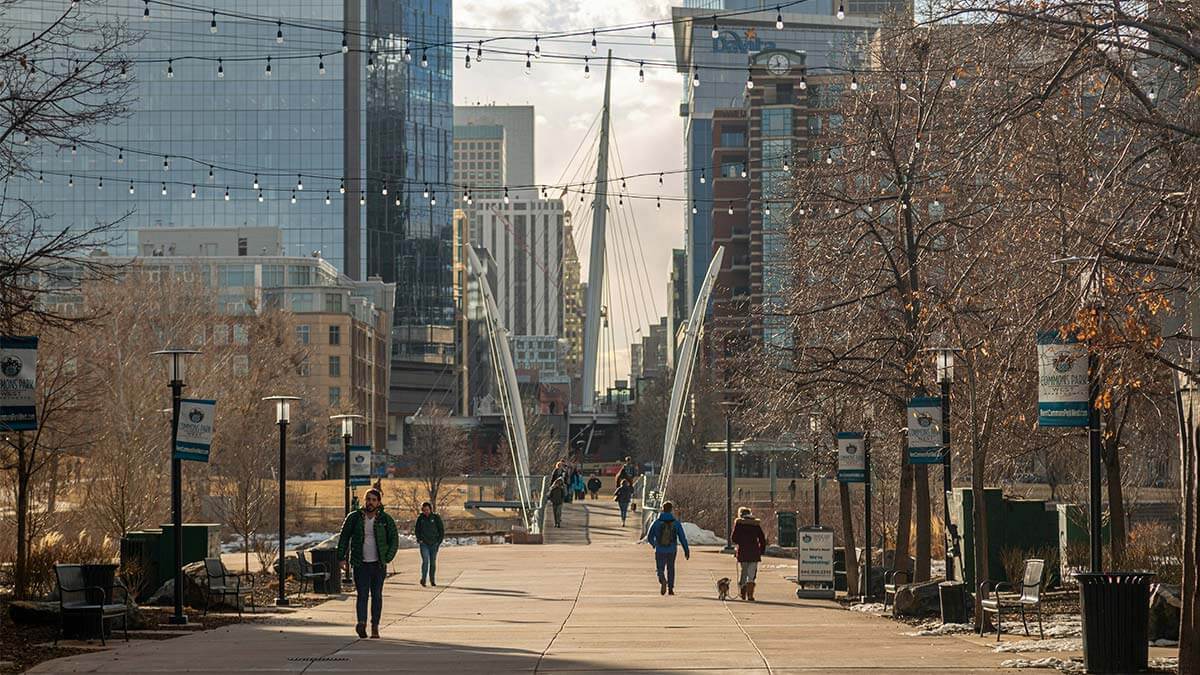Thinking about moving to Denver? You’re not alone. With its mountain views, sunshine, and booming job market, the city has serious appeal. But let’s talk dollars, because living here isn’t cheap. From rent to groceries to gas, costs can add up fast if you’re not ready.
In this guide, I’ll walk you through what it really costs to live in Denver. We’ll break it down by housing, transportation, taxes, and more. Whether you’re renting a studio downtown or raising a family in the ‘burbs, you’ll know what to expect.
And if you’re already here but thinking of moving out, we’ve got your back too. Get a data-backed cash offer from iBuyer.com and sell your Denver home on your schedule, no listings, no drama.
Instant Valuation, Confidential Deals with a Certified iBuyer.com Specialist.
Sell Smart, Sell Fast, Get Sold. No Obligations.
Cost of Living in Denver
- Denver’s Cost of Living Index , How It Stacks Up
- Housing Costs in Denver: Rent, Home Prices & More
- Transportation Costs & Public Transit Options
- Utilities, Groceries & Goods and Services
- Taxes & Household Income in Denver
- Cost of Living Calculator , Plan Your Denver Budget
- Is Denver Worth It?
- Just Ask Jordan
Denver’s Cost of Living Index , How It Stacks Up
Living in Denver costs more than the U.S. average, about 12% more, depending on the source. That means your paycheck won’t stretch quite as far here as it would in other mid-sized cities. Housing is the biggest factor, but groceries and transportation are no slouch either.
The cost of living index is a number that compares prices in different cities. A score of 100 is average for the United States. Denver scores around 112, which puts it in the “expensive but not outrageous” category.
It’s not San Francisco or New York, but it’s definitely not cheap. If you’re moving from a smaller town or lower-cost area, you’ll feel the pinch, especially when it comes to rent and real estate.
While Denver remains a major draw, many of the best cities to live in Colorado offer strong job opportunities and great quality of life at a lower cost.
Housing Costs in Denver: Rent, Home Prices & More
Housing in Denver isn’t just pricey, it’s the main reason the cost of living here feels high. In 2025, the average rent in Denver is around $1,900 for a one-bedroom apartment. If you’re downtown, expect to pay even more. Looking for a two-bedroom? That’ll run you closer to $2,400.
Thinking about buying instead of renting? The median home price in Denver is hovering near $590,000. That’s a lot higher than the national average, and first-time buyers are definitely feeling the squeeze. Property taxes aren’t awful, but mortgage rates and insurance costs can add up fast.
If you’re flexible on location, neighborhoods outside the city core, like Lakewood or Aurora, can offer better deals. But even those areas are getting more competitive as people look for affordable options nearby.
Transportation Costs & Public Transit Options
Getting around Denver isn’t dirt cheap, especially if you’re driving daily. Gas prices usually sit above the national average, hovering around $3.80 a gallon lately. If you live downtown, expect to pay $150 or more per month just for parking. Throw in insurance, which averages about $1,600 a year in Colorado, and owning a car can quickly eat into your budget.
If you’re looking to cut costs, public transportation is an option. RTD (Regional Transportation District) runs buses and light rail trains across Denver and the suburbs. A local monthly pass is about $114, and a regional one is closer to $200. It’s great if you live near a major route, like the light rail running through Union Station, but coverage can be spotty in some neighborhoods.
Denver’s also fairly bike-friendly, with dedicated lanes in spots like South Pearl and Cherry Creek. Many locals bike to work when the weather’s nice. If you’re living in LoDo, Capitol Hill, or RiNo, you might even be able to walk or scoot to most of your daily spots. But if you’re commuting from Highlands Ranch or Parker? You’re probably driving.
Utilities, Groceries & Goods and Services
Living in Denver means budgeting more than just rent and gas, everyday expenses like groceries and utilities can sneak up on you too. On average, utilities (electricity, heating, water, and trash) for a 900-square-foot apartment run about $180 per month. Add internet, and you’re looking at another $60 to $80.
Groceries here are a bit steeper than in many U.S. cities. A gallon of milk is about $4.00, and a dozen eggs can run you over $3.50. A quick grocery run for basics, milk, bread, fruit, and protein, might cost $70 or more. Eating out? A casual meal is around $18 per person, and coffee runs $5+ at most local spots.
Goods and services like gym memberships, haircuts, and daycare also come with big-city prices. A gym pass could cost $60 a month, while daycare can easily top $1,400 depending on the area. These are the day-to-day costs that make Denver feel expensive, even if you’re not living large.
Taxes & Household Income in Denver
Let’s talk about what you keep, and what you lose, to taxes in Denver. Colorado has a flat income tax rate of 4.4%, which is lower than some states but still takes a bite out of your paycheck. Add in Denver’s sales tax, which combines state, city, and special district rates, and you’re looking at about 8.81% on most purchases.
Property taxes in Colorado are actually pretty low compared to the national average, just around 0.5% of your home’s assessed value. That’s a small win if you own, especially considering how high prices have climbed.
As for income, the median household income in Denver is roughly $85,000. But with rising costs, that doesn’t go as far as it used to. Many folks say it takes closer to $100,000 to live comfortably, especially if you’ve got a family or want to save while renting or paying a mortgage.
Cost of Living Calculator , Plan Your Denver Budget
Not sure if your paycheck will cover Denver’s rising costs? A cost of living calculator is a smart place to start. These tools compare what you’re currently earning to what you’d need to make to live comfortably in Denver. They factor in housing, food, transportation, and more, so you’re not guessing in the dark.
Let’s say you’re making $70,000 in Dallas. A calculator might show you’d need closer to $78,000 in Denver just to break even. If you’re coming from a cheaper city like Omaha or Tulsa, the jump could be even steeper, up to 20% more for the same lifestyle.
These calculators are also great for breaking down your average monthly expenses. You can see how much rent, groceries, utilities, and even gym memberships could run you in different neighborhoods. Sites like NerdWallet, Payscale, and Numbeo offer free tools that take just a few minutes to use.
Budgeting ahead can save you from sticker shock, and help you figure out if Denver’s a fit before you pack a single box.
With rising living expenses, many homeowners are choosing to sell their Denver home for top dollar and relocate to more affordable areas.
Is Denver Worth It?
Denver isn’t the cheapest place to live, but for many, it’s worth every penny. You get sunshine nearly year-round, easy access to the Rockies, and a lively mix of food, culture, and career opportunities. That said, it’s not the budget-friendly city it once was.
If you’re still deciding where to settle, our guide to the best places to buy a house in Denver breaks down top neighborhoods for every lifestyle.
If you’re making a solid income or working remotely, you might find it manageable. But if you’re just starting out or trying to raise a family on a tight budget, the costs can stretch you thin. Housing alone eats up a big chunk, and daily expenses can sneak up fast.
Bottom line? Know your numbers, plan ahead, and be honest about what you can afford. And if you’re ready to move, whether it’s into or out of Denver, iBuyer.com can give you a fair, cash offer without the hassle of listings or open houses.
Compare Cash Offers from Top Home Buyers. Delivered by Your Local iBuyer Certified Specialist.
One Expert, Multiple Offers, No Obligation.
Just Ask Jordan
I’ve worked with all kinds of buyers and sellers in Denver, from first-timers hunting for a small condo to families trading up to a place with a yard. If there’s one thing I’ve learned, it’s that no two budgets stretch the same way in this city.
Some folks ask if they really need six figures to live here. Truth is, it depends. If you’re renting in Capitol Hill with roommates, you might get by on $60K. But if you’re hoping to buy in Highlands and have kids in daycare? You’ll probably need closer to $120K just to stay comfortable.
Others wonder if moving to a suburb helps. It can. Places like Thornton or Lakewood offer more space for less money, and you still get easy access to downtown. But don’t forget to factor in gas, commuting time, and property taxes, they can shift the balance.
If you’re trying to figure out whether Denver makes financial sense for you, I’d always say run the numbers twice, and ask someone who’s lived it.
Honestly, it’s how much heating can cost in winter. Older homes especially can bleed money in December and January. I’ve seen utility bills double if the place isn’t well insulated.
If you’re planning to stay for 5+ years, yes. Prices have cooled a bit from the pandemic peak, but demand is still strong. I’ve helped buyers score good deals by looking just outside the city core.
I’ve had good luck with clients in places like Wheat Ridge and Arvada. You’re 20 minutes from downtown, but homes are cheaper and you get more space. Plus, the community vibe is strong in those spots.
Jordan Wagner is an iBuyer Certified Specialist who helps Denver-area homeowners navigate today’s fast-changing housing market with clarity and confidence. With years of local expertise and a deep understanding of iBuyer programs, cash offers, and traditional sales, Jordan provides straightforward guidance tailored to each client’s situation. Whether you’re exploring the fastest way to sell, weighing multiple offers, or planning your next move, Jordan brings a data-driven, client-first approach that ensures you make informed decisions. Known for his dedication and local market insight, Jordan has earned a reputation as one of Denver’s most trusted housing advisors.




